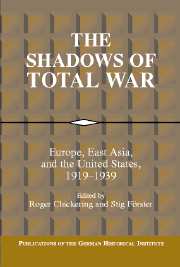Book contents
- Frontmatter
- Introduction
- Part One Reflections on the Interwar Period
- Part Two Legacies of the Great War
- Part Three Visions of the Next War
- 8 Sore Loser: Ludendorff’s Total War
- 9 Strangelove, or How Ernst Jünger Learned to Love Total War
- 10 Shadows of Total War in French and British Military Journals, 1918-1939
- 11 Yesterday’s Battles and Future War: The German Official Military History, 1918-1939
- 12 “The Study of the Distant Past Is Futile”: American Reflections on New Military Frontiers
- Part Four Projections and Practice
- Index
12 - “The Study of the Distant Past Is Futile”: American Reflections on New Military Frontiers
Published online by Cambridge University Press: 05 January 2013
- Frontmatter
- Introduction
- Part One Reflections on the Interwar Period
- Part Two Legacies of the Great War
- Part Three Visions of the Next War
- 8 Sore Loser: Ludendorff’s Total War
- 9 Strangelove, or How Ernst Jünger Learned to Love Total War
- 10 Shadows of Total War in French and British Military Journals, 1918-1939
- 11 Yesterday’s Battles and Future War: The German Official Military History, 1918-1939
- 12 “The Study of the Distant Past Is Futile”: American Reflections on New Military Frontiers
- Part Four Projections and Practice
- Index
Summary
Never in all the world's history has the likes of the present culture developed. . . . The study of the distant past is futile; the answer is not there. . . . Once wars were won by defeating an army. The next war may be won by destroying the people that furnish the army. . . . Surely the enemy will strike not the fortified position but the basis of the whole army - industry and the people. . . . It is more than useless to decry the terrible casualties that aircraft will cause among noncombatants. That feeling comes from the day when warfare had a certain honor, even dignity. Today it has little: tomorrow none. . . . Consequently, our future conflicts will likely be wars of extermination. . . . The human has at hand weapons of immense destructive power; no philosophy or decency to stop him from using them.
In July 1939 Major J. Halpin Connolly offered this vision of the next war in the pages of the Infantry Journal, one of the preeminent American military periodicals. Like the Field Artillery Journal, the Military Review (published by the Command and General Staff School in Ft. Leavenworth, Kansas), and the U.S. Naval Institute Proceedings, the Infantry Journal was a product of the services' professionalization in the 1920s. Amid the financial pressures of the Great Depression, the Infantry Journal, Coast Artillery Journal, and the Cavalry Journal pooled articles to ensure a wider circulation. By the late 1930s the Infantry Journal had become a forum for broad-minded, seminal thought that prompted the others to improve the quality of their content. Even though it did not entirely mature in this role, it came close to offering an “all-Army forum” open to the other services as well, particularly to the air corps, which was still affiliated with the Army.
- Type
- Chapter
- Information
- The Shadows of Total WarEurope, East Asia, and the United States, 1919–1939, pp. 239 - 252Publisher: Cambridge University PressPrint publication year: 2003



